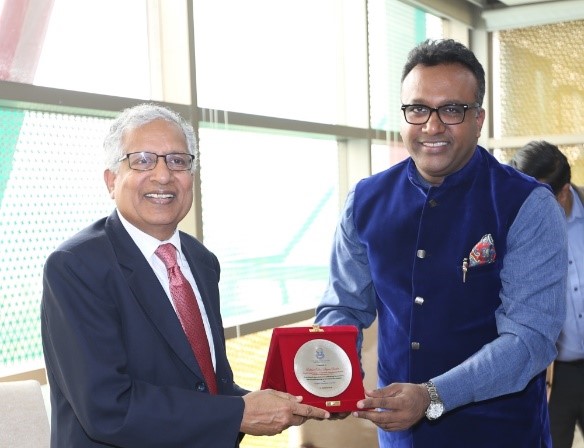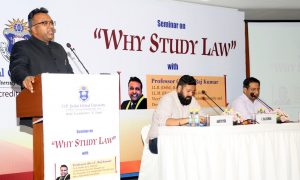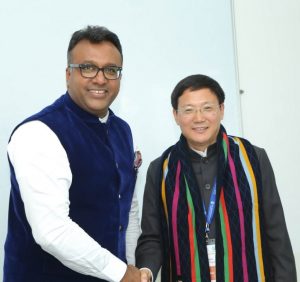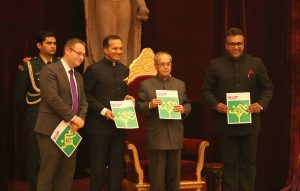Sonipat, Haryana, India: Professor (Dr.) Shyam Sunder, James L. Frank Professor of Accounting, Economics, and Finance, Yale School of Management, U.S.A. delivered an insightful and interactive session on “Higher Education in India” bringing into focus several pressing issues facing higher education in the country.
He was speaking at the seminar organised by the International Institute for Higher Education Research and Capacity Building (IIHEd) at O.P. Jindal Global University.
Professor (Dr.) C Raj Kumar Vice Chancellor O.P. Jindal Global University and Director IIHEd while delivering his welcoming remarks appreciated Dr. Sunder commitment to India and bringing about transformative change in higher education in India.
Professor Kumar observed “Dr. Shyam Sunder’s deep and passionate commitment towards India and his desire to see transformative change in higher education in India resonates of a similar vision and passion that JGU and IIHEd have for changing the face of higher education in the country”.
Speaking about the role and importance of universities today Dr. Sunder said, “In 1950 Nehru said that dams are the new temples of India, in today’s context the new age and modern universities are the new temples of modern India”.
He also stressed on the need for establishing many more such new universities and said, “There aren’t enough being built”.
He further noted that like there was a shortage of good universities similarly there was not enough innovation that was taking place, “I work on education and innovation and there is not enough of innovation in India. Europe and a large part of the western world have innovation both in thought and material elements and a lot of it has originated from universities”. India does not have enough PhD holders and is lacking behind China and United States. He mentioned that the number of candidates who have done PhD in China is gradually catching up with the number of candidates who have done PhD in the United States.
Prof. Sunder raised the relevant question of what was holding India back and went on to define the factors, he said, “ Three factors that are responsible for the lack of innovation are insufficient talent, financing and governance in universities.”
Explaining what he meant by talent he said, there is not a sufficiently large number of people from the top of a class that choose teaching as a profession. He observed that when you ask in universities how many will come back and teach, there are very few hands that go up and even those are laughed at. The profession of teaching needs to be revitalised through policy reforms as well as through the change in the mindset of people of the country.
Speaking of finance, he said, “The amount of money needed to deliver quality education is very large, one above average Chinese university has a budget of all the IIT’s put together.” This definitely calls for huge investment into higher education, not only from the government but also from the private sector.
He observed that the meaning of private in India is very different from the world “the world over private means that they do not get government support and in India this largely and unfortunately means for profit and in small portions means philanthropic initiatives”.
He spoke about the need to learn lessons from Yale, Harvard and MIT where only 10 -14 % of the funding comes from students and more than 40 % comes from philanthropy that too mostly from alumni.
Speaking on governance he said that both the prevalent models – bureaucratic model and business model cannot be applied in universities
He further pointed out that, “the process of innovation is very inconvenient and may be disruptive. You might tell some grey haired guy that what you did is no longer relevant. The question is who is going to evaluate, the same grey haired guy.” He observed that in India there is too much respect given to grey hair and too little recognition to innovation.
Prof. Sunder concluded the session focusing on the need to establish an association for the advancement of higher education where by true philanthropic initiatives and innovation in higher education could be encouraged.
Prof. Dr. Shyam Sunder is a world-renowned accounting theorist and experimental economist. His research contributions include financial reporting, information in security markets, statistical theory of valuation, and design of electronic markets.
IIHEd is an independent research institute within JGU that will be focused on pursuing research and capacity building initiatives on different aspects of higher education in India and beyond, with the vision of contributing towards institution building for nation building.
IIHEd recently collaborated with Times Higher Education to host the “Times Higher Education BRICS Emerging Economies Universities Summit 2015” on the theme: “Why Emerging Economies need World Class Universities” held in India for the first time.




